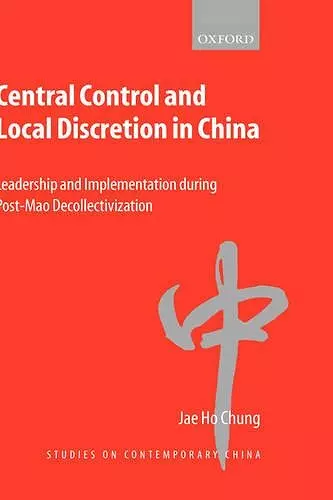Central Control and Local Discretion in China
Leadership and Implementation during Post-Mao Decollectivization
Format:Hardback
Publisher:Oxford University Press
Currently unavailable, and unfortunately no date known when it will be back

This book analyses the decollectivization reform in China during the early 1980s in order to gauge the impact of post-Mao decentralization on central control and provincial discretion. The volume challenges the notion that the decision to decentralize administrative authority ipso facto produces local discretion properly keyed to local conditions. In fact, outcomes often differ from the intended goals. While, generally, local interests and central-local clientilistic networks determine the policy responses of the provinces, bureaucratic careerism also plays a crucial role. In the case of post-Mao decollectivization, national-level analyses suggest that a majority of provinces adopted household farming neither too quickly nor too slowly, since both 'pioneering' and 'resisting' entailed potentially enormous political risks. Once Beijing's preference appeared firmly fixed, however, they all quickly bandwagoned by popularizing the policy as swiftly as possible. Three detailed case studies of Anhui as a pioneer, Shandong as a bandwagoner, and Heilongjiang as a resister further highlight the evolutionary process in which provincial variations came to be replaced by uniform compliance imposed by Beijing. Theoretically, this study contends that the overall scope of local discretion is circumscribed by the dominant norms and incentive relations embedded in the implementation dynamics. Methodologically, the book employs a combination of aggregate analyses and comparative case studies. Empirically, on the basis of newly available materials (including classified documents) and interviews, it challenges the 'peasant-power' school which has somehow allowed local governments to evaporate in its descriptions of post-Mao decollectivization.
Because of the sheer size of China's population and territory, the relationship between central and local government in China has been a crucial topic for investigation. Jae Ho Chung's new book is a considerable step forward in expanding our knowledge on the topic. It sheds new light on centre-province relations in China through a thorough analysis of the process and ramifications of decollectivization during the early 1980s. It offers a sophisticated and convincing explanation for provincial discretion in implementing central policies in the process * The China Journal *
ISBN: 9780198297772
Dimensions: 242mm x 162mm x 17mm
Weight: 474g
224 pages